Photographs: Reuters Priyanka Joshi & Aabhas Sharma
The mobile apps revolution is here. Market research firm Gartner estimates that this year alone, mobile users across the globe will pay more than $6.2 billion to buy 'mobile applications' -- games, social networking tools, productivity and entertainment-based mini programmes for mobile phones.
And this despite the fact that 80 per cent of these will be free downloads anyway this year.
Apps have become the business with the fastest turnaround time in the software industry. In just one month an application can be developed and marketed to a global community of enthusiastic downloaders.
Sample this. In January this year, 3 billion apps were downloaded from the Apple app store, which has more than 100,000 titles in categories such as games, business, news, sports and health.
BlackBerry App World has around 4,000 titles and Google's Android Market, 20,000.
. . .
Mobile apps and 7 successful Indian developers!
Photographs: Reuters
Little wonder, then, that mobile app developers, a non-existent breed just five years ago, are crawling out of the woodwork. Students, teachers, even doctors have jumped into the fray, competing with career software professionals.
In India, the world's second biggest mobile phone market of more than 500 million consumers and a large community of software programmers, there is fierce competition among developers to deliver apps that run on different handsets and technology platforms.
What's driving their business are online app stores on the Apple, Nokia, Samsung and Sony Ericsson websites, and on Facebook and Orkut, where developers can sell directly to consumers. Of course, they must pay a yearly fee and 30 per cent of their revenues to the service platform.
But this is a better scenario -- there was a time when app developers earned a paltry 10-15 per cent as royalty from mobile service providers.
. . .
Mobile apps and 7 successful Indian developers!
Image: (Inset) Rohit Singal.Photographs: Reuters and Business Standard
Software doctor
Rohit Singal's story begins with that well-worn cliche about startups -- three people in a garage.
Singal, a radiologist, came across an open source software programme called Osirix, designed for radiologists, while at medical school in the US.
"Using Osirix, I implemented a full picture archive and communications system within my medical school, and so began my love for software."
That interest soon blossomed into a company called Sourcebits, which creates software for medical purposes as well as games and other general apps. Singal was lucky to get a developer's licence for the iPhone, that really propelled him into the big league.
(A developer must pay a $99 yearly fee to be part of the iPhone developer programme, which allows him to build apps for the Apple iPhone and iPod Touch. Apple must also approve an app before it can go into the store.)
Thirty-something Singal's company developed Nightstand, one of the first clock apps for the iPhone, which has been downloaded over 2.5 million times. He has also developed games such as The Plateau and Funbooth, a face detection app which helps you apply fun props to any picture.
In the last three years, Sourcebits has developed and launched over 70 mobile applications for the Apple, Facebook and Android platforms.
Singal himself is surprised. "It's exciting for us to be at the forefront of the new mobile economy," says the IT entrepreneur. And not for a day does he miss being a radiologist.
. . .
Mobile apps and 7 successful Indian developers!
Image: (Inset) Kiran TrivediPhotographs: Reuters and Business Standard
Yes, professor
The dissertation papers submitted by his students convinced Kiran Trivedi, assistant professor and head of department (electronics and communication) at the Government Engineering College, Surat, that he had to work twice as hard to stay ahead of his proteges.
And he has been doing exactly that with his pathbreaking mobile apps.
Four years ago, when GPS-based handsets (global positioning systems that contain maps and information) were unheard of, Trivedi created an application for his Nokia phone that could act like a GPS device and track the handset's whereabouts.
Trivedi, who firmly believes that mobile apps will become as big if not bigger than the Internet, has since then developed a host of award-winning mobile apps that run on Nokia phones.
In 2008, Trivedi's ATM Locator app was showcased at the Symbian Smartphone Show in London. It helps users locate the nearest ATM machine of their bank, along with distance and directions. Another creation, a mobile phone-based wireless alcohol and metal detector, was exhibited at the Mobile World Congress 2009 in Barcelona.
Trivedi is now a highly regarded Nokia app developer. "I get the latest Nokia handsets much before they are launched in India so that we (he and his students) can develop apps for them."
Although he hasn't made money on his apps, the Bhavnagar-based academician is keeping his options open. "I like being a professor," he says, adding, "but if the trend in mobile apps continues, I may become a full-time developer."
. . .
Mobile apps and 7 successful Indian developers!
Image: (Inset) Mariam DholkawalaPhotographs: Reuters and Business Standard
Fingers crossed
Mariam Dholkawala had an MBA, but what she really wanted to do was special effects for entertainment media. "But no production house was willing to take me in because I did not have the qualifications," she recalls.
So she agreed enthusiastically when a friend, who was starting a company to develop educational CD-ROMs, asked her to join as a programmer. Learning on the job, she read books and blogs on game development, learnt from code sharing by other developers and started building her own catalogue of games.
In 2007, Dholkawala started IGameStudio with mobile apps like Globe Trotter and Hotel Guide, meant for people on the move who needed information about restaurants, hotels, shopping, clubs and sightseeing in the cities they were visiting.
"I knew the application would generate small profits as it was not meant for the mass market. But it would be a stepping stone, helping me know the limits before attempting more commercially profitable ideas," she explains.
Self-funded, Dholkawala says she has invested around Rs 8 lakh (Rs 800,000) in the past eight to 10 months on a two-member team. "As for sales, we are yet to hit the jackpot." But she is hopeful, since this year the company will launch a few commercial applications.
. . .
Mobile apps and 7 successful Indian developers!
Image: (Inset) Rohith BhatPhotographs: Reuters and Business Standard
The selling code
For Rohith Bhat, a BTech in computer science and founder of Robosoft, writing programming codes (2,000 lines requires about 100 man hours) came easy. But what he didn't know anything about was how to sell the apps to customers directly.
The launch of the app store on Apple iTunes took away that headache.
The company began with gaming apps under the 99Games brand name. Its first title, Chess Pro, released in October 2008, just months after the Apple app store debuted in July 2008.
"The success of Chess Pro was surprising and motivated us to concentrate on app development," recalls Bhat. "Mobile apps allow independent entrepreneurs the possibility of owning precious real estate on their customers' phones," he says.
99Games' second offering -- WordsWorth -- became the top word game on the Apple app store. "It was also in the Top 100 app list for more than a month," says Bhat, who has waited for over 18 months to hit the jackpot.
"Our camera utility app -- Camera Plus -- crossed the over 5 million download mark last month. It is still going strong at more than 20,000 downloads a day," he exults. Hopeful of breaking even this year, Robosoft has already absorbed investments of Rs 1 crore (Rs 10 million).
His family, says Bhat, is his 'favourite guinea pig'. "My three-year-old daughter got so hooked to the iPod that I had to get her one to stop her from grabbing mine."
. . .
Mobile apps and 7 successful Indian developers!
Image: (Inset) Abhijit JayapalPhotographs: Reuters and Business Standard
Firm belief
Abhijit Jayapal was doing his summer internship with Motorola at their headquarters in Schaumburg, Illinois, in 2000, when he realised "the tremendous potential of the mobile medium".
An MBA from the Mason School of Business, College of William & Mary, Virginia, Jayapal could have had a corporate career for the asking. Motorola, Accenture, Fannie Mae and even (briefly) Mobile2Win in India feature on his CV, but he has given all that up to become an app developer.
Synqua Games was founded in May 2008 -- just when the world economy was taking a beating. "When we started, I wanted our debut game app to be a runaway success. But the first one turned out to be just average, so I junked it," says the 32-year-old Jayapal.
Synqua's next, an IPL T20 cricket app, turned out be the most downloaded game last year (Airtel Mobitude Survey). "Our games are beginning to gain traction in international markets. Our latest app, Arjuna, was the number one game in Vietnam," reveals Jayapal.
The young entrepreneur counts his 16-18-hour days as part of the game. "Our business is comparable to a game -- in this case, points are real money," he concludes.
. . .
Mobile apps and 7 successful Indian developers!
Image: (Inset) Harishankar NarayananPhotographs: Reuters and Business Standard
Finding his metier
As a teenager, the now 26-year-old Harishankar Narayanan was crazy about computer games. He studied mechanical engineering, but learnt computer programming on the side and spent most of his time writing codes for computer engineering students.
"I enjoyed doing that," says Narayanan, notorious for being the most mischievous kid in his school -- a quality he says is "essential for game developers".
Soon after college, Narayanan landed a job as a software engineer with the Chennai-based Real Image Media Technologies. But within a year, he started Smackall Games (2006). Those were tough times, he recalls, with mobile gaming just taking off. Service providers paid a pittance for the games he developed -- only about 10-15 per cent as royalty.
But then came the smart phones, taking mobile gaming to a different level. Since then Smackall has developed many games for different platforms like Symbian, Java, iPhone and Windows.
Smackall's iCopter game was the most downloaded game in 23 countries for over two months at the iTunes store.
Narayanan is currently working on an action-adventure-sci-fi title, a game in which the world has to be saved from aliens after a Doomsday disaster. "Sounds like someone saving me from mechanical engineering," he says, and the grin on his face widens.
. . .
Mobile apps and 7 successful Indian developers!
Image: Sridhar Bhat and his family.Photographs: Business Standard
Family business
Sridhar Bhat has rather unusual testers for games developed by iRemedi, the Atlanta-based company he founded in August 2008 -- his children. "We have professional testers, of course, but my kids test the apps and tell me whether they're easy for 4-9 year olds. This is a subset of our potential customers and for my kids it is fun," says Bhat.
His children have helped out in other ways too. PicZee Pro, iRemedi's best-selling app (a photo puzzle app which allows you to take pictures and play with them as jigsaw puzzles), has an artwork by his daughter Sanjana as a default picture.
"When Apple released the iPhone Software Development kit in March 2008 inviting developers to partner, we applied," reveals Bhat. He was working then, but gave it up after making sure he had saved enough to tide him over for a year. Bhat had done his math and knew his money was backing the right horse.
"With Apple's iTunes store on each iPhone, even five per cent of the smartphone market means a potential five million customers. With iPod Touch also sharing the iPhone platform, the potential customer base doubles," he estimates.

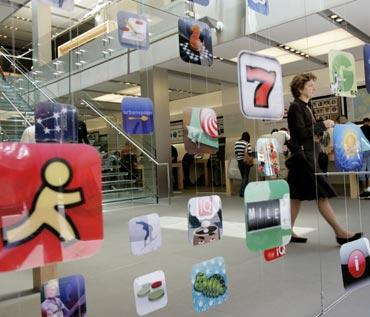
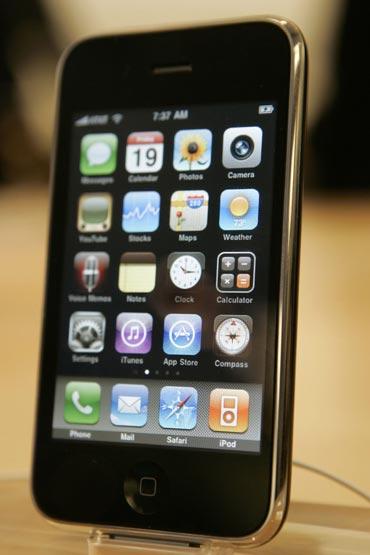
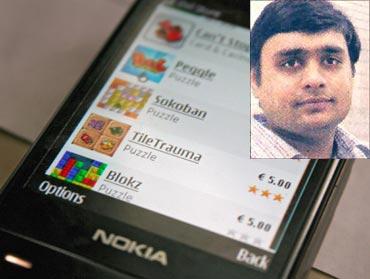
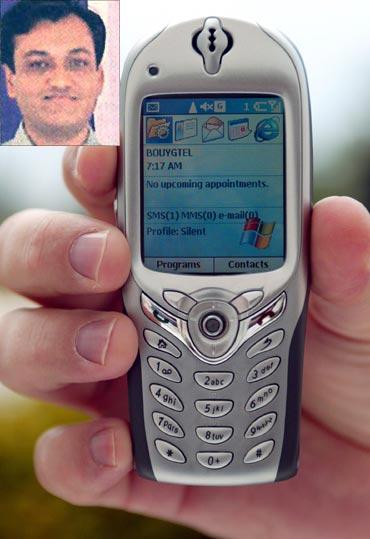
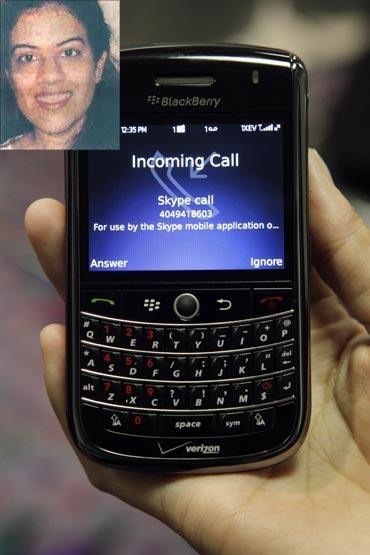
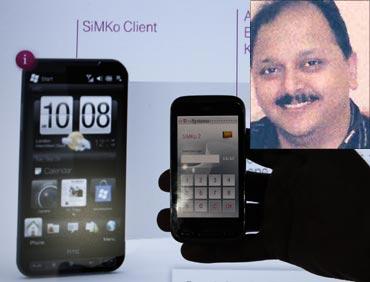
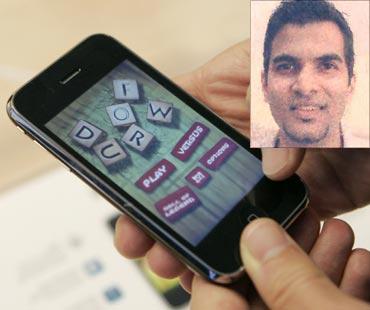
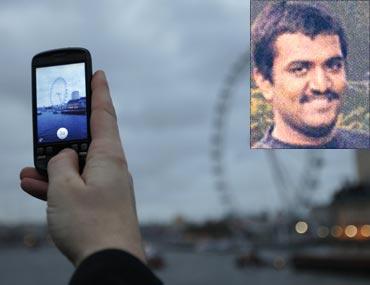
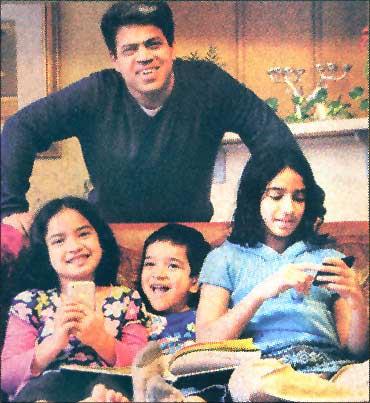

article